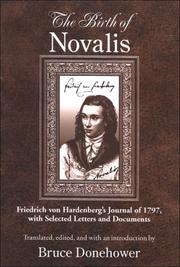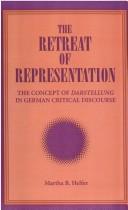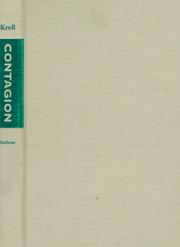| Listing 1 - 4 of 4 |
Sort by
|

ISBN: 0791480682 1429465697 9781429465694 0791469697 9780791469699 9780791480687 Year: 2007 Publisher: Albany : State University of New York Press,
Abstract | Keywords | Export | Availability | Bookmark
 Loading...
Loading...Choose an application
- Reference Manager
- EndNote
- RefWorks (Direct export to RefWorks)
A frank and candid glimpse into the early life of the maturing poet.

ISBN: 0585042985 9780585042985 0791429113 0791429121 9780791429112 0791429113 9780791429129 0791429121 1438406371 Year: 1996 Publisher: Albany State University of New York Press
Abstract | Keywords | Export | Availability | Bookmark
 Loading...
Loading...Choose an application
- Reference Manager
- EndNote
- RefWorks (Direct export to RefWorks)
Representation (Philosophy) --- Idealism, German. --- Romanticism --- Idealism, German --- Philosophy --- Philosophy & Religion --- Aesthetics --- Pseudo-romanticism --- Romanticism in literature --- Fiction --- Literary movements --- German idealism --- Representationalism (Philosophy) --- Representationism (Philosophy) --- Culture --- Kleist, Heinrich von, --- Novalis, --- Novalis --- Novalis, Friedrich --- von Hardenberg, Friedrich Ludwig, --- Hardenberg, Friedrich, --- Hardenberg, Georg Friedrich Philipp, --- Hardenberg, Georg Philipp Friedrich von, --- Kleĭst, Genrikh, --- Kleist, Bernd Heinrich Wilhelm von, --- Kleist, H. V. --- Ḳlaisṭ, Hainrikh fun, --- קלייסט, היינריך --- קלייסט, היינריך פון, --- קלייסט, הינריך פון, --- Criticism and interpretation. --- von Kleist, Heinrich

ISBN: 0585130124 9780585130125 0253333717 0253211700 Year: 1998 Publisher: Indianapolis Indiana University Press
Abstract | Keywords | Export | Availability | Bookmark
 Loading...
Loading...Choose an application
- Reference Manager
- EndNote
- RefWorks (Direct export to RefWorks)
Although the Romantic Age is usually thought of as idealizing nature as the source of birth, life, and creativity, David Farrell Krell focuses on the preoccupation of three key German Romantic thinkers - Novalis, Schelling, and Hegel - with nature's destructive powers: contagion, disease, and death. Krell brings to light little-known texts by each writer that develop theories about the intertwined beneficent and maleficent aspects of nature. Krell's investigations reveal that the forces of sexuality and life are also seen as the carriers of disease and death. The insights of Novalis, Schelling, and Hegel offer surprisingly relevant perspectives for contemporary science and for our own thinking - in an age of contagion.
Philosophy of nature --- Nature --- Nature, Philosophy of --- Natural theology --- History --- Philosophy --- Novalis, --- Schelling, Friedrich Wilhelm Joseph von, --- Hegel, Georg Wilhelm Friedrich, --- Hegel, Giorgio Guglielmo Frederico --- Hegel, Georg Wilhelm Friedrich --- Schelling, Friedrich Wilhelm Joseph von --- Schelling, F. W. J. --- Schelling, Friedrich Wilhelm Joseph --- Schelling, Federico Guillermo José --- Novalis --- Novalis, Friedrich --- von Hardenberg, Friedrich Ludwig, --- Hardenberg, Friedrich, --- Hardenberg, Georg Friedrich Philipp, --- Hardenberg, Georg Philipp Friedrich von, --- Contributions in philosophy of nature. --- Hegel, Georg Wilhelm Friedrich. --- von Schelling, Friedrich Wilhelm Joseph --- Hēgeru, --- Hei-ko-erh, --- Gegelʹ, Georg, --- Hījil, --- Khegel, --- Hegel, G. W. F. --- Hegel, --- Hei Ge Er, --- Chenkel, --- Hīghil, --- הגל, --- הגל, גאורג וילהלם פרידריך, --- הגל, גיאורג וילהלם פרידריך, --- הגל, ג.ו.פ, --- היגל, גורג ווילהלם פרדריך, --- היגל, גיורג וילהלם פרידריך, --- 黑格尔, --- Hegel, Guillermo Federico, --- Hegel, Jorge Guillermo Federico, --- Heyel, Georg Wilhelm Friedrich, --- Higil, Gʼūrg Vīlhim Frīdrīsh, --- هگل, --- هگل، گئورگ ويلهم فريدريش,
Book
ISBN: 9780226084060 9780226084237 022608423X 1306269830 9781306269834 022608406X Year: 2014 Publisher: Chicago, Ill. The University of Chicago Press
Abstract | Keywords | Export | Availability | Bookmark
 Loading...
Loading...Choose an application
- Reference Manager
- EndNote
- RefWorks (Direct export to RefWorks)
The absolute was one of the most significant philosophical concepts in the early nineteenth century, particularly for the German romantics. Its exact meaning and its role within philosophical romanticism remain, however, a highly contested topic among contemporary scholars. In The Romantic Absolute, Dalia Nassar offers an illuminating new assessment of the romantics and their understanding of the absolute. In doing so, she fills an important gap in the history of philosophy, especially with respect to the crucial period between Kant and Hegel. Scholars today interpret philosophical romanticism along two competing lines: one emphasizes the romantics' concern with epistemology, the other their concern with metaphysics. Through careful textual analysis and systematic reconstruction of the work of three major romantics-Novalis, Friedrich Schlegel, and Friedrich Schelling-Nassar shows that neither interpretation is fully satisfying. Rather, she argues, one needs to approach the absolute from both perspectives. Rescuing these philosophers from frequent misunderstanding, and even dismissal, she articulates not only a new angle on the philosophical foundations of romanticism but on the meaning and significance of the notion of the absolute itself.
History of philosophy --- Novalis --- Schelling, von, Friedrich W.J. --- Schlegel, Friedrich --- Germany --- Absolute, The --- Philosophy, German --- German philosophy --- Metaphysics --- Ontology --- One (The One in philosophy) --- History --- Novalis, --- von Schelling, Friedrich Wilhelm Joseph --- Schlegel, Friedrich von, --- Schlegel, Friedrich von --- Shlegelʹ, Fridrikh --- Schlegel, Karl Wilhelm Friedrich von --- Von Schlegel, Karl Wilhelm Friedrich --- Schlegel, Federico --- Schlegel, Frederick von --- Schelling, Friedrich Wilhelm Joseph von --- Schelling, F. W. J. --- Schelling, Friedrich Wilhelm Joseph --- Schelling, Federico Guillermo José --- Novalis, Friedrich --- von Hardenberg, Friedrich Ludwig, --- Hardenberg, Friedrich, --- Hardenberg, Georg Friedrich Philipp, --- Hardenberg, Georg Philipp Friedrich von, --- Absolute, The. --- Schelling, Friedrich Wilhelm Joseph von, --- the absolute, germany, romanticism, philosophy, being, knowing, kant, hegel, epistemology, metaphysics, friedrich schelling, schlegel, novalis, subjectivity, self, hemsterhuis, whole, nature, idealism, ontology, transcendentalism, becoming, freedom, romantic novel, spinoza, fichte, art, identity, nonfiction, goethe, jacobi, von hardenberg, mind, spirit.
| Listing 1 - 4 of 4 |
Sort by
|

 Search
Search Feedback
Feedback About UniCat
About UniCat  Help
Help News
News